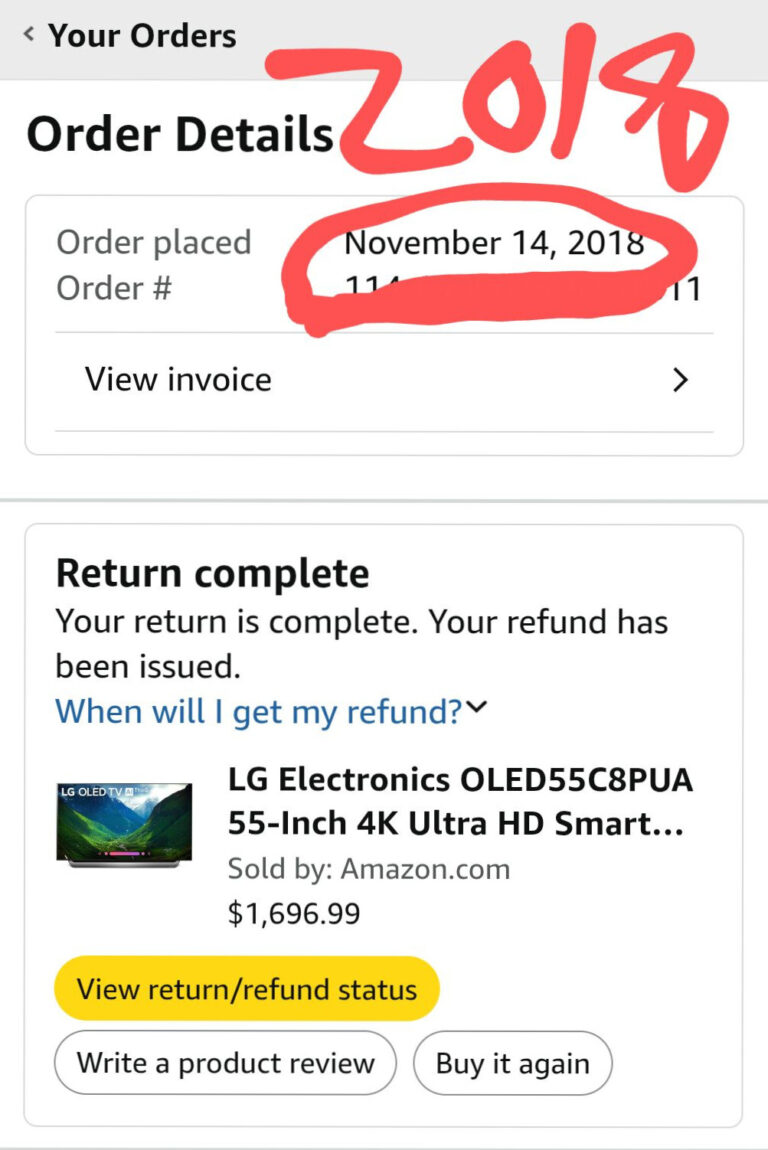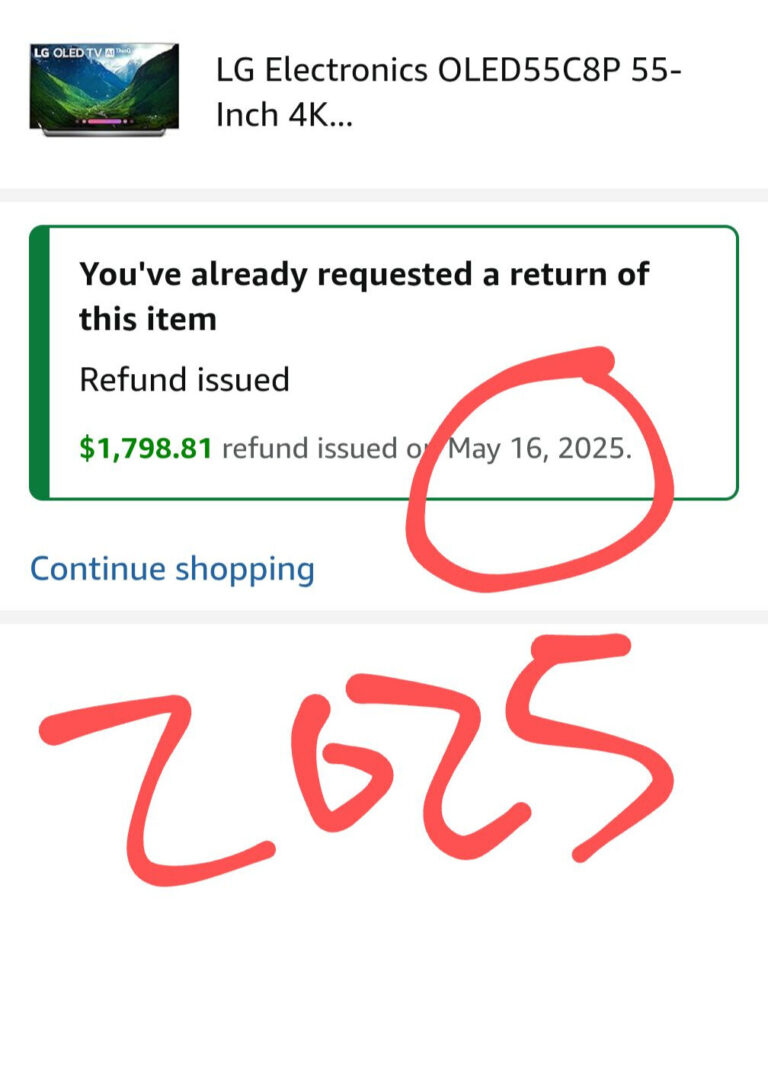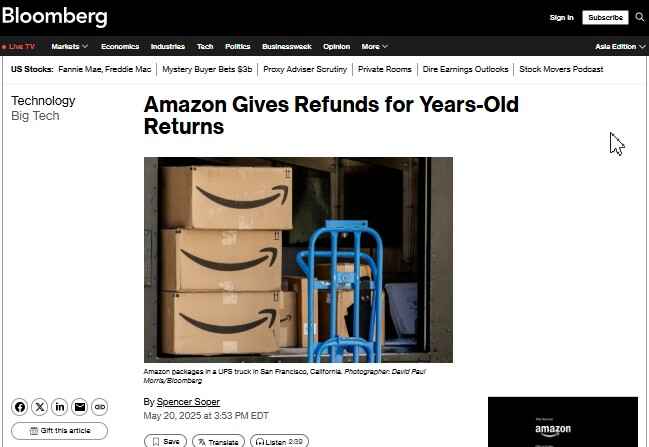When an Amazon refund delay spans 7 years, it’s hard to call it customer service.
Amazon says most refunds are quick. Credit card? 3–5 business days. Debit card? Up to 10. Gift card? Practically instant.
So why did it take seven years for some customers to get their money back? Amazon calls it an “unresolved return issue.” Others call it exactly what it looks like: a delayed reaction to legal heat.
Was it really about doing the right thing or avoiding a bigger courtroom disaster?
As an Amazon agency, we help sellers navigate the maze Amazon calls a refund process. If Amazon can’t keep its own house in order, sellers need to be twice as prepared.
Table of Contents
Amazon refund delay hits the news
Steven Pope, founder and CEO of My Amazon Guy, recently shared a jaw-dropping experience on LinkedIn. In 2025, he received a refund of $1,798.81 for a return originally submitted in 2018.
Steven questioned if others had gone through something similar, and it’s a fair assumption they have. A seven-year delay is far from standard and raises concerns beyond simple customer service delays.
Amazon’s official response
Amazon explained in an email that it had identified a “very small subset” of unresolved returns during a recent internal review. These were cases where Amazon couldn’t confirm the correct item had been returned.
What Amazon admitted
They admitted to poor communication in these situations.
Due to the time that had passed, they opted to issue refunds anyway as a customer-first decision.
Refund process details
Amazon processed the refund using the original payment method. If that method was no longer active, the refund was applied as an Amazon gift card.
Refund timeframe
Credit/debit card refunds: 3–10 business days
Amazon gift card: Available within 2–3 hours
No action was required from Steven to receive his refund
Improvements promised
Amazon stated that it has made internal process changes to reach out to customers more quickly when there are unresolved returns.
Accessing details
Customers were advised to visit “Your Transactions” to view refund details, suggesting an effort to increase transparency.
Steven Pope’s 7-year refund isn’t just a quirky one-off it reflects a broader breakdown in Amazon’s return verification process. While Amazon claims to have made improvements, this incident highlights the importance of timely communication and efficient resolution for both buyers and sellers.
Amazon refund delay hits the news
A recent flood of delayed refunds from Amazon, some going back as far as 2018, is drawing attention across the internet and major media. With $1.1 billion written off, the scale of the issue is far more serious than one might expect.
Refunds Resurface After Internal Review
Steven wasn’t the only customer to receive a surprise refund as similar stories surfaced across social media.
This story was picked up by Bloomberg and reported by journalist Spencer Soper, who noted that Steven was the only one using his real name rather than an online alias.
This confirms that Amazon began issuing refunds to many customers for long-overdue returns. Amazon cited an internal review that uncovered a “very small subset” of unresolved returns where they couldn’t confirm if the right product had been returned.
Corporate accountability and financial impact
The scope of the issue isn’t entirely clear, but it’s far from trivial. Amazon CFO Brian Olsavsky disclosed a $1.1 billion one-time charge in Q1 2025 earnings, attributed partly to unresolved customer returns and also to inventory management costs related to tariff concerns.
Amazon’s 2024 revenue reached $638 billion, making it the second-largest company by revenue after Walmart, so the financial blow is significant, even at that scale. A company spokesperson confirmed that refunds are ongoing but declined to disclose total numbers or costs involved.
Steven Pope’s refund goes viral
Steven Pope’s story of a 7-year Amazon refund delay quickly gained traction as it was picked up by multiple news outlets and websites. What began as a personal account became a spotlight on broader concerns about Amazon’s return system.
As the founder of an Amazon agency, Steven knows how crucial timely refunds are for maintaining customer trust and seller confidence. “Seven years to pay out a return,” he wrote; words that resonated with many sellers and buyers who’ve faced similar frustrations in Amazon’s complex fulfillment network.
USA Today highlighted Steven Pope’s case as part of a broader report on Amazon issuing refunds for purchases as far back as 2018, tied to a class-action lawsuit that was recently upheld in court.
AARP featured Steven’s experience in their coverage explaining why Amazon customers are now receiving refunds for returns made years ago.
Newsweek included Steven’s refund delay in their report on unexpected Amazon refunds due to unresolved returns dating back several years.

Entrepreneur mentioned Steven’s story as part of their article about Amazon refunding purchases from as early as 2018.
NBC 5 Chicago referenced Steven’s viral post in their piece discussing customer reports of refunds for 2018 returns.

LiveNOW from FOX noted Steven’s case while reporting on Amazon’s announcement of issuing refunds after an internal review.

The Economic Times covered Steven’s situation in their report on who is receiving old Amazon refunds amid a lawsuit and $1.1 billion charge.
Blavity News pointed to Steven Pope’s refund example in explaining how customers might be eligible for money back on years-old Amazon purchases.
Cybernews specifically referenced Steven Pope’s $1,800 refund for a return made seven years ago as part of their coverage.

Rolling Out reported Steven Pope’s $1,800 refund for a 2018 TV return, noting his viral LinkedIn post as a standout example of the growing frustration shared across social media.

MSN spotlighted Steven Pope as one of the earliest known recipients of Amazon’s retroactive refunds, referencing his LinkedIn post and USA Today’s coverage.

News X highlighted Pope’s viral story about a seven-year delay on a TV return refund, which brought wider attention to Amazon’s internal refund audit and related lawsuit.

The Arizona Republic (AZCentral) cited Pope’s experience and LinkedIn post in its local coverage, emphasizing Amazon’s note that time elapsed prompted them to issue the refunds.

FOX 5 Atlanta included Steven Pope’s viral claim of a $1,798.81 refund for a 2018 TV, underlining the extraordinary delay he described on LinkedIn.

ChannelNews mentioned Pope as one of the customers finally refunded after seven years, quoting his post questioning Amazon’s prolonged response time.

Independent featured Pope’s story of receiving nearly $1,800 for a 2018 return, using his LinkedIn quote to illustrate the unexpected nature of the refunds.
AOL referenced Pope’s $1,800 refund and widely shared LinkedIn post, noting the unusual length of time it took Amazon to resolve his return.
Yahoo News reported on Steven Pope’s refund as part of the broader issue of Amazon compensating customers for 2018 returns, highlighting his viral post questioning the delay.
Legal pressures, a driving force behind the Amazon refund delay?
Amazon’s decision to issue refunds may not be solely about customer service. A consumer lawsuit, originally filed in 2023 and still active, accuses Amazon of reversing refunds from customers who followed its return process by dropping items at designated kiosks.
The issue? Some customers were later recharged when the returned merchandise didn’t make it back to an Amazon facility. While the company’s stance is that this policy was meant to combat fraud, a federal judge denied Amazon’s motion to dismiss the case in April 2025.
Jon Derkits, commenting on Steven Pope’s LinkedIn post, suggested that the refund delay might be connected to a federal class-action lawsuit currently pending in court. The lawsuit claims Amazon failed to honor refunds for returned products, despite customers following the correct return procedures.
Filed in the U.S. District Court for the Western District of Washington, the case centers around accusations that Amazon:
Withheld or reversed refunds for items returned within its standard 30-day window
Left customers to discover missing refunds only through credit card or bank statement reviews
The lead plaintiff, Holly Jones Clark of Kentucky, alleges that Amazon issued instant refunds only to retract them later without proper notice. The lawsuit highlights a disconnect between Amazon’s written policies and the actual customer experience.
The court has not yet certified the class, which means it hasn’t officially decided whether more consumers will be included in the case. If certification is granted, any customer who returned an item in acceptable condition but didn’t receive a refund, or had it reversed, may be eligible to join the case.
At this time, Amazon has not publicly responded to the allegations. The final payout amount, if any, remains unknown, and any legal fees would likely come from a future settlement or court judgment.
Fraud, returns, and retail losses
The backdrop of all this is a broader fraud problem in e-commerce. Refund delays are not just affecting buyers, sellers are also under pressure from a growing wave of return-related fraud.
Fraudulent returns are becoming a bigger concern for Amazon sellers, cutting into already thin margins and disrupting operations. According to a Forbes report, independent sellers say these scams are rising in frequency and severity.
Regulatory heat: government agencies take notice
Amazon’s sheer size and market dominance, along with its complex seller relationships, have also attracted scrutiny from regulatory bodies.
- FTC Sues Amazon for Monopoly Power (Impacting Sellers)
In September 2023, the Federal Trade Commission (FTC) and 17 state attorneys general sued Amazon, alleging it illegally maintains monopoly power. The lawsuit claims Amazon uses anti-competitive strategies that harm both consumers and sellers. Crucially for sellers, the complaint highlights:
- Punishing sellers for lower prices elsewhere – Amazon can bury sellers in search results if they offer products cheaper on other platforms.
- Conditioning “Prime” eligibility on using Amazon’s costly fulfillment service – This makes it more expensive for sellers to use other platforms.
- Charging “sky-high fees” – The FTC alleges these fees force many sellers to pay close to 50% of their total revenues to Amazon, harming sellers and leading to increased prices for shoppers. While not directly about “refund delay,” these practices create immense financial pressure and dependency, making any fund withholding or delay even more impactful.
- FTC Action Against “Click Profit”
In March 2025, the FTC acted to stop an operation called “Click Profit,” which allegedly deceived consumers with false promises of profiting from AI-powered online stores, primarily on Amazon. The FTC noted that Amazon had blocked, suspended, or terminated about 95% of Click Profit’s stores, highlighting Amazon’s power to shut down seller operations, which inevitably involves fund management and potential delays or disputes.
The unseen "Vigilance Tax" on sellers
This deeper dive underscores a harsh reality: selling on Amazon often involves paying an unspoken “vigilance tax.” This is the immense time, energy, and resources sellers must pour into:
- Constant Monitoring – Scrutinizing reports for FBA discrepancies, fee overcharges, and unpaid reimbursements.
- Meticulous Record-Keeping – Maintaining flawless documentation for inventory, costs, and communications, as the burden of proof almost always falls on the seller.
- Navigating Complex Claim Processes – Understanding and adhering to strict deadlines and evidence requirements for various claim types (FBA, SAFE-T).
- Fighting for Due Process – Persistently challenging incorrect decisions through often frustrating support channels and, if necessary, complex arbitration.
This isn’t just about occasional delays; it’s about an environment where sellers must constantly be on guard to protect their own earnings from a system that can feel opaque and, at times, adversarial.
Amazon Refund Delay FAQs
What items will Amazon refund without return?
What happens if you miss the Amazon return date?
How to return something after three days to Amazon?
Can I get a refund if my package is delayed?
Stay sharp on Amazon: Know the rules, guard your dollars
Amazon may be a marketplace of convenience for buyers and a land of opportunity for sellers, but it’s far from perfect. As this 7-year refund delay shows, even a giant like Amazon can drop the ball.
For buyers, staying alert means checking transactions and questioning unexplained charges. But for sellers, the stakes are even higher.
To thrive on Amazon, sellers must do more than just list products, they need to stay vigilant, document everything, and prepare for the unexpected. Amazon’s policies, processes, and occasional slip-ups can create serious risk if you’re not ready.
Need help navigating it all? Contact our full service Amazon agency, for expert guidance. We help sellers protect their margins, resolve claims, and stay compliant in a system that doesn’t always make it easy.
Let us help you make Amazon work for you, not against you.





